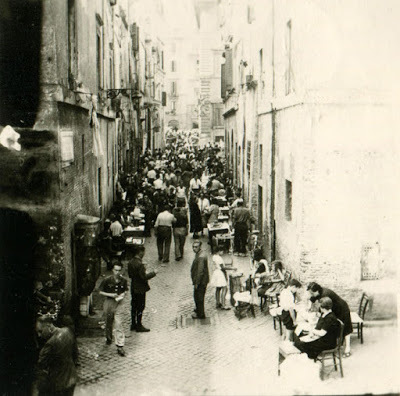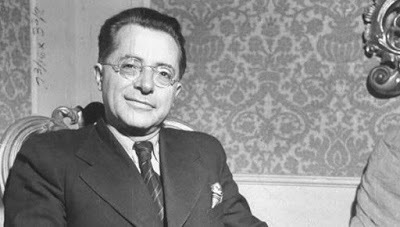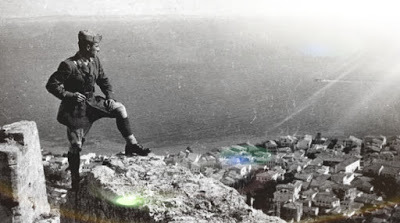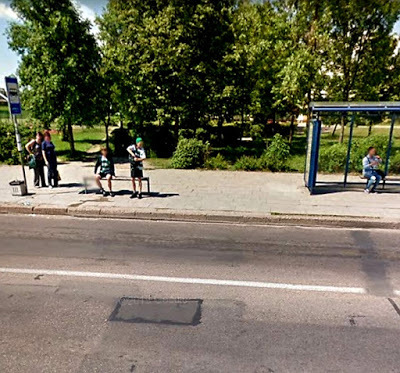Fabrizio Ulivieri's Blog, page 99
March 8, 2020
Italians

This ideal man is the man who displays "dynamic conformity" (delicious phrase!) and an intense loyalty to the group, an unflagging desire to subordinate himself, to belong.
(Aldous Huhley)
Užupis is a district of Vilnius - the so-called Republic of Artists. There is a restaurant right there, in the centre of the little central square – a magnificent place, very close to the bridge that you incontrovertibly must cross arriving from Onos Bažnyčia.
This restaurant is well known to the Italian community of Vilnius. Famous and illustrious Italian gourmands, above all, characterized by their big bellies, bad breath, satisfied faces, bright and vivid eyes yearning for food use to cross the bridge and go there for dinner.
They have the most elaborated possible philosophies regarding their stand with respect to traditional recipes. Pasta alla puttanesca, carbonara, spaghetti alla amatriciana.
One of the most vexed questions debated among them is indeed which is the original way to prepare the real pasta alla amatriciana (which – to be honest - I find quite unpleasant on the palate). An eternally unsolved question, since are many heretical positions regarding it.
Otehr long-term diatribes are: “which wine with which course?” (that is a worthy and admissible question, for me as well), or “how the right pesto alla genovese has to be done?”
They are ruthlessly fighting, opposing one dogma to another dogma. No jokes. Those are real problems, where no minimal oversight is allowed.
There is also a famous Facebook group, called Italian Gourmets in Vilnius, where scholarly talks and discussions about the above-mentioned themes are regularly held.
The tone of their philosophical discussions is very high. One of the most recent debates was “Does free will exists in elaborating recipes or is there any compatibilism?”
Of course, by watching them, I can't help but quote Eco’s words in the Prague Cemetery “Only fools need to keep a woman, or a young boy, under their bedcovers not to feel alone. They don’t understand that a watering mouth is better than an erection.”. In fact, in this community, sex and everything that can realistically or metaphorically refer to sexuality has been strictly banned in favour of the upper part of their body, the belly.
A detached observer (is it, anyway, possible a detached observer?) who randomly were sitting under the obelisk adjacent to the restaurant entrance and should have the chance to watch them swarming back and forth from and to the restaurant would probably be under the impression to see a swarm of obnoxious insects aligned with the hope of food.
I remember that once I had a chat with one of the members. I realized how impeded he was to distinguish the world around him (Vilnius) and the world he left behind himself many years ago (Italy). He lived in a new world, which he ignored though, because he still thought to live in the world he used to live before. “You know this is my dividend of being excluded from Italian life.”, he tried to justify his evident contradiction.
Inconsequential platitudes. Just inconsequential platitudes. That was the way those people were. Meaningless expression of platitudes, taken by themselves.
I was a martial artist, I was not interested in food. Food for me was just a way of supplying my need for energy. I didn’t feel any pleasure in eating.
But Italians in Vilnius, because of their persistence in their credo, reminded me of a philosophical distinction. The distinctions between hedgehog-thinkers and fox-thinkers.
Fox-thinkers being those without a unitary inner vision, hedgehog-instead thinkers with a unitary inner vision.
Italians are bearers of a single, universal message. They tend to confine themselves to one exclusive activity. Eating.
Or maybe they probably are foxes by nature but saw a better chance of being hedgehogs.
For many Italians living in Vilnius their peculiarity was the not too demanding arte di Michelasso: Mangiare bere, andare a spasso e non fare un casso!
One of these particularly versed in such art. was Mr Fake. He was fake, completely fake. Nothing real, nothing concrete and original I can mention of him.
He had no job but pretended to be in the business of macaroni. When he met an Italian in Vilnius he showed the logo of his macaroni brand, In MaccheroniVeritas, as if he had a great business to start in that sector
His agenda was to be liked by everyone, to be loved by friends and people. He usually avoided taking a stand, because he was in an urgent need to be rewarded by as many people as possible (to maybe better fool all of them).
Another way to show his disguised emotions was to sell himself as a great chef.
Every day he prepared macaroni, il piatto del giorno, and posted the photos on Facebook.
Was he a real chef? Of course not. He was fake. He was 99.99% fake.
All these things had made of him a nice flibbertigibbet, to the point that no one had an interest in taking him seriously. But he still insisted to hang onto his chef and manager reputation to persuade everybody that he was what he wasn’t.
In his attempt to forge a fake personality he appeared to devote himself to a calling much higher than his mere (poor) attempt.
Mr Fake was preposterous. He drove his utilitaria along the streets of Vilnius. He wore a faded red hat, a heavy leather air force jacket, tennis shoes, washed-out jeans and a flamboyant blue shirt wide open on the chest, with just one button that closed tightly at the height of the jutting belly ungratefully sticking out from the rest of the shirt. He was immune to the cold Lithuanian winter. He had a good reserve of fat to burn.
He was always (summer and winter) sweating and smoked cigars (Plasencia – reserva). He showed a bristly white beard and was soon going bald.
- I have always paid women. Without paying; I didn’t get pleasure.
That was one of his best memories. He was made up of memories, probably invented memories.
Once he entered a shop in Vilniaus gatvė
There still was a vynoteka, at that time. But now no longer. It closed one year ago. In Vilnius shops open and close, go to bankrupt, at an impressive speed. Vilnius is a city dominated by the Jewish mentality (in Vilnius until the Second World War there was the, probably, biggest Jewish community of Europe). Of the three Baltic capitals, Vilnius is the most expensive. The prices for rents are often crazy, beyond any human logic
When he entered, the sun was setting behind the buildings, he heard a voice.
- Are you Mr C*? The Chef? The Italian chef who every day is posting his piatto del giorno on Facebook?
- That’s who I am - he said without turning and spotting the voice.
- Do you remember me?
- Yes, of course, I remember you – said Mr C*?, blankly. But of course, he didn’t know who she was.
- I am Julija, I am always commenting on your posts.
- Hi, Julija. Nice to meet you.
- Nice to meet you. I knew it was you...I saw many pictures of you on Facebook. For me, it is a big honour to meet you in the flesh...personally, I mean.
Mr C* seemed to not appreciate much that compliment since he knew that is flesh was quite generous. And the lady had probably noticed his disappointed look because she promptly had added: “personally, I mean”.
- Upon my word – went on the lady – you are much better in the flesh...I mean...in person, face to face...than in the Facebook’s photos.
Mr C* again didn’t respond with relish to that new compliment. He was peeved again by the repetition of in the flesh...
- Do you think? – he answered levelly.
Published on March 08, 2020 11:57
March 2, 2020
The window we were staring at (Part II)

What is beyond that window, beyond that rain? She levelly asked me.
Fear. I responded.
For what? she answered.
For life. The life that could have been, but it is not. It has been designed a life that from the beginning runs between hatred and hope to be redeemed. And this is the most absurd thing we experience every day. We have been created as a resource for the elites, you know, this is the truth, but we aspire to something greater, this is the truth because inside us there are the same genes of our creators. I watched her. I realized she was confused. She was in a state of cognitive dissonance.
Let's take into account what is happening beyond that window. Can you believe that this is a pandemic?
Isn't it? She replied.
There are many reasons to doubt it. Too many. First of all, it is not so lethal. No more than normal influenza. It kills the elderly, mostly.
Why? She asked.
We are too many in this world. We have to eliminate the "useless eaters" as somebody called the elderly. So it is designed.
But designed by whom?.
I don't know. By somebody who designed it in a lab. Whose plans are not clear. The propaganda they did has been a masterpiece. People now are scared, in panic. They looted supermarkets. Every day media talks about the virus, hours and hours...people are in a panic.
There are a lot of electromagnetic waves, out there...
She surprised me with that observation.
What are you talking about? I asked.
The human frequency, the human energy, I understand, can be manipulated using a virus, which is a different energy, to disturb the electric field of humanity. To create disharmony in our existences.
Oh! I said. You can put in that way if you want. I didn't think like you think. But why not? Maybe you are more clever than me. Maybe you are right.
Again we stared at the window, a frail glass partition, that prevented us to be part of the horror living out there. Whatever was happening beyond that partition was still far from our lives. We felt safe, though. Protected.
And we were still calm, without panicking.
The world has so changed, different from when I was a kid. Almost unrecognizable.
Published on March 02, 2020 23:25
February 23, 2020
À propos de coronavirus in Italy

It is always the same story, when there is a country to be hit in Europe, Italy is the first. The answers can be many, many the narratives, but I believe that Italy is an easy target, since Italians are prone to accept everything; there are no rebellions, no riots, no insurgences but only passive acceptance in this land. Italy historically has been a mere geographical expression unable to cope with the strength of far more virile peoples, if not by using deception, betrayal, turnaround, and the most squalid machiavellism. Italy has never been a real State since the fall of Roman Empire.Gli italiani non hanno palle* this is the hard truth. Those who had le palle and sense of honour have been killed and exterminated during the First and Second World War, and the survivors were brainwashed through the occupation of the key posts in the Italian state structures by a silent army of leftist organic intellectuals, which in name of a globalist politically correct distopia have completely depallizzato** the Italian Spirit, if any.
*Italians don't have guts
** they have removed the virile pride
Published on February 23, 2020 08:12
February 22, 2020
The window we were staring at (Part I)

Your parents died well. They cannot complain, they ended well. They had money, a lot of badanti taking care of them, you and your brother. They had all. Don't be sad. You did all you could.
She stared at me, through her half closed eyes.
She paused. I breathed.
Here in Lithuania - she went on - they could be considered rich people. Many elderly in Lithuania struggle with poverty, solitude and depression...that was not the case with your parents.
But they saved the money, they deserved it - I replied.
Of course - she said - of course...I didn't mean that they didn't deserve it. I wanted to say that they had a good end, nothing more, and you don't have to feel guilty because you decided to leave them and to move to Lithuania. But remember here the elderly rarely have the same chances your parents had...
You know - I replied - it must be true, it must be true that there must be an inequality between a dominant class and an under their rule class from the very beginning...something genetically established from the very beginning...a superior class against an inferior class. How can you explain otherwise this hatred, this indifference to the sufference of people. People are poor, they die for wars they don't want, governments don't represent the interests of people but the interest of the dominant class...how is this possible? Do I bore you?
No! Why do you ask?
I had the impression I was boring you.
You know that I have alway wanted to have a professor in my life. She laughed.
Good. Therefore it must be true that at the beginning of our species another species there must be, a species come from the space. A reptilian species, maybe.
She fell silent.
I fell silent.
Listen, she said, it is raining like in summer.
The door was open, the rain falling was heard.
What strange winter, like a prolonged autumn without end was accompanying the sound of the rain outside, beyond the opened window we were staring at.
Published on February 22, 2020 13:13
The window we were staring at

Your parents died well. They cannot complain, they ended well. They had money, a lot of badanti taking care of them, you and your brother. They had all. Don't be sad. You did all you could.
She stared at me, through her half closed eyes.
She paused. I breathed.
Here in Lithuania - she went on - they could be considered rich people. Many elderly in Lithuania struggle with poverty, solitude and depression...that was not the case with your parents.
But they saved the money, they deserved it - I replied.
Of course - she said - of course...I didn't mean that they didn't deserve it. I wanted to say that they had a good end, nothing more, and you don't have to feel guilty because you decided to leave them and to move to Lithuania. But remember here the elderly rarely have the same chances your parents had...
You know - I replied - it must be true, it must be true that there must be an inequality between a dominant class and an under their rule class from the very beginning...something genetically established from the very beginning...a superior class against an inferior class. How can you explain otherwise this hatred, this indifference to the sufference of people. People are poor, they die for wars they don't want, governments don't represent the interests of people but the interest of the dominant class...how is this possible? Do I bore you?
No! Why do you ask?
I had the impression I was boring you.
You know that I have alway wanted to have a professor in my life. She laughed.
Good. Therefore it must be true that at the beginning of our species another species there must be, a species come from the space. A reptilian species, maybe.
She fell silent.
I fell silent.
Listen, she said, it is raining like in summer.
The door was open, the rain falling was heard.
What strange winter, like a prolonged autumn without end was accompanying the sound of the rain outside, beyond the opened window we were staring at.
Published on February 22, 2020 13:13
February 18, 2020
Machiavellism, transformism and Togliatti

Renato Mieli, in Togliatti 1937, captures well the synthesis between Machiavellism and transformism, which in the post-war period from 1945 onwards was mainly introduced in Italy by the PCI.
"The Italian Communist leaders [who were in Russia during the Stalinist purges] possessed a particular quality that made them less vulnerable than others: political ductility. By instinct, perhaps more than by calculation of prudence, they knew how to adapt themselves promptly and with discretion to Stalinist politics, of which they shared the official line, ignoring what was contradictory and conflicting in practice. They dosed their consent so as not to provoke Stalin's diffidence, but to avoid, at the same time, making himself co-responsible for his policy in the most brutal aspects."
Such a a similar system experimented in Russia - the subtle art of adapting to the situation, being a lion and a fox of Machiavellian memory, avoiding the risks that a little less malleable position would entail - Togliatti reimplanted in the Italian culture when he arrives at Neaples.
On March 26, 1944, Italy's fate changes. It takes a more precise direction, which will produce its effects up to the present.
From the fishing boat "Pescara", Palmiro Togliatti disembarks in the port of Naples after twenty-five years away from Italy and from that day on, nothing will be the same. He came from the Soviet Union where he had been alongside Stalin. He had been one of Stalin's closest collaborators.
Vesuvius was erupting that day and the ashes and fire of the volcano were breathed in the air.
As those ashes had conquered the sky of Naples, Togliatti understands that he will have to conquer Italy in the same pervasive way with ideas and not with weapons. He would have applied the Gramsci’s theories of organic intellectual.
In fact, the first thing Togliatti did was to found the Review "Rinascita", which came out in July 1944. And in the first issue, Benedetto Croce the most important representative of liberal Italian culture was violently attacked. Also personally attacked.
With those attacks, Togliatti sent a message. He wanted to make the Italian communists understand who was the enemy to fight on a cultural and ideological level.
Another important message Togliatti sent to Italian intelligentsia on the day of the killing of Giovanni Gentile, claiming the killing of the philosopher. He defined the filosofo as a criminal, and claimed the killing as just and fruit of the will of the people. Gentile assassination warned all academics and intellectuals (Gentile unlike Croce had power in universities and publishing houses). The message was this: things have changed now; now we are in charge, but we can purify you, if you, fascist and gentiliani intellectuals, come over to our side, everything will be forgiven you and you will be redeemed. Intellectuals, a fearful and servile race, rushed en masse. We will transform you from fascist to organic intellectual. We will give you a new life and a new identity.
From these two events, Italian culture moves to the left. Fundamental in this shift is the "Partito d’azione" intermediate ideology. The basic idea of the Partito d'azione was this: liberalism had to find more advanced balances, liberalism had to be anti-fascist but not anti-communist, and therefore attention and dialogue had to be opened with the communists, with the aim of bringing them on more democratic positions.
This organic-vision will determine the Italian political and cultural ideology from the post-war period onwards to the present day, according to the axiom that one can be anti-fascist but not anti-communist because being anti-communist means being fascist.
Published on February 18, 2020 07:08
Machiavellism, transformism and Togliatt

Renato Mieli, in Togliatti 1937, captures well the synthesis between Machiavellism and transformism, which in the post-war period from 1945 onwards was mainly introduced in Italy by the PCI.
"The Italian Communist leaders [who were in Russia during the Stalinist purges] possessed a particular quality that made them less vulnerable than others: political ductility. By instinct, perhaps more than by calculation of prudence, they knew how to adapt themselves promptly and with discretion to Stalinist politics, of which they shared the official line, ignoring what was contradictory and conflicting in practice. They dosed their consent so as not to provoke Stalin's diffidence, but to avoid, at the same time, making himself co-responsible for his policy in the most brutal aspects."
Such a a similar system experimented in Russia - the subtle art of adapting to the situation, being a lion and a fox of Machiavellian memory, avoiding the risks that a little less malleable position would entail - Togliatti reimplanted in the Italian culture when he arrives at Neaples.
In fact, the first thing Togliatti did was to found the journal "Rinascita", which came out in July 1944. And in the first issue, Benedetto Croce the most important representative of liberal Italian culture was violently attacked.Togliatti also moved personal attacks. But there was a reason. With those attacks, Togliatti sent a message, he wanted to make the Italian communists understand who was the enemy to fight on a cultural and ideological level.Another important message Togliatti sends to Italian intelligentsia on the day of the killing of Giovanni Gentile, claiming the killing of the philosopher. He defines the filosofo as a criminal, and claimed the killing as an act of justice and fruit of the will of the Italian people. By killing Gentile Togliatti warned all academics and intellectuals (Gentile unlike Croce had power in universities and publishing houses). The message was this: things have changed now; now we are in charge, but we can purify you, if you, fascist and gentiliani intellectuals, come over to our side, everything will be forgiven to you and you will be redeemed. Intellectuals, a fearful and servile race, rushed en masse.From these two events, Italian culture (almost every intellectual was fascist until 1945) moves to the left, as well. Fundamental in this shift is The Partito d'Azione ideology. The basic idea of the action party was this: liberalism had to find more advanced balances, liberalism had to be anti-fascist but not anti-communist, and therefore attention and dialogue had to be opened with the communists, with the aim of bringing them on more democratic positions. This vision will determine the Italian political and cultural ideology from the post-war period onwards to the present day, according to the axiom that one can be anti-fascist but not anti-communist, because being anti-communist means being fascist.
Published on February 18, 2020 07:08
January 24, 2020
January 21, 2020
Il giorno che l'Italia Morì - Romanzo Morale su uno Stato mai Sovrano

Un romanzo sull’Italia, che va dall’ 8 settembre 1943 all’agosto 2017.
Un romanzo che ha la tecnica del romanzo ma mischia l’analisi del saggio.
L’Italia è protagonista di questo romanzo. Sabatina, casalinga, e Silvano, politico, milita nel PSI a fianco di Bettino Craxi, accompagnano le vicende di quella Italia. Le loro vite si muovono deterministicamente inviluppate alle vicende stesse dell’Italia, sebbene ritengano che le loro vite abbiano autonomia e volontà individuale, rispetto alla storia d’Italia. Sebbene inconsciamente ritengano che la loro storia, siano essi stessi a determinarla.
Un romanzo che cerca la morale nella vita in modo esplicito attraverso un romanzo-saggio.Può essere letto in anteprima in modo integrale su Academia.edu: https://www.academia.edu/41519795/Il_giorno_che_lItalia_mor%C3%AC
Published on January 21, 2020 06:43
January 12, 2020
L'uomo impermanente (parte quinta)

Unaquaque res, quantum in se est, in suo esse persevarare conatur (Spinoza, Ethica)
Venendo da Siesikų stotelė in autobus, fissavo le linee geometriche della strada, che davano il profilo di un'altra cultura. Più essenziale, meno bella, più controllata. Non era la mia cultura. Non era la cultura del paese in cui ero nato e vissuto per così tanti anni.
È questo il risultato dell'epigenesi - mi chiedevo - che ha dato forma alla mia coscienza per cui ora giudico ciò che vedo?
Si dice che siano i primi sette anni di vita a strutturare l'individuo. Sono i primi sette anni di vita quando scarichi tutti i programmi di cui hai bisogno per vivere il resto della tua esistenza. È questa l’epigenesi che guida l'esistenza dell'individuo?
Qui, dove vivo ora, non c'è l'idea della follia di Erasmo, non c'è la visione dell'eroico furore di Giordano Bruno, o l’ideologia dello Zarathustra di Nietzsche che ti ispira a andare oltre il limite, forzare al massimo la propria natura, oltre la propria condizione presente.
Qui, bevono e si ubriacano per dimenticare il limite. Non è mia natura bere e ubriacarmi. Ho dovuto fare appello a tutte le mie energie per superare questo nuovo concetto di limite a cui mi stavo abituando. Ho dovuto allora cercare in me quella forza visionaria che alcune persone hanno chiamato follia, e che da sola ti fa superare il limite invalicabile.
Ho guardato fuori dal finestrino dell'autobus, la precisione di quelle linee geometriche e le statuine umane che sembravano esservi incollate con estrema precisione.
Roma – ho pensato in quel momento - ebbe Scipione l'Africano e Fabio Massimo il Temporeggiatore. Scipione non avrebbe mai potuto diventare Fabio Massimo e Fabio Massimo non avrebbe mai potuto diventare Scipione, perché l'uomo è radicato nel corpo, nella propria materia, nella sua natura, da cui è quasi impossibile per lui fuggire, tranne attraverso la trascendenza della follia che gli consente di oltrepassarlo.
Solo un atto di furia e follia poteva rompere la gabbia dell'epigenesi.
Ma che tipo di atto era quell'atto, capace di spezzare l'epigenesi come il vetro di una finestra? Di cosa avevo bisogno per rompere quella natura e fuggirne via?
Volevo sparire da quel mondo. Pensai mentre sprofondavo nel sedile vicino al finestrino dell'autobus.
Volevo chiudere gli occhi e per sempre. Scomparire. Con quel semplice atto, volevo annientare me stesso e il mio insopportabile dolore di vivere.
Era sempre stata un'idea radicata in me da sempre. Se però fosse stato un vero desiderio di suicidio o un solo desiderio logico di scomparire, non potevo decidere.
Ricordo ancora come un giorno mi sia diviso in due parti. Una parlava e l'altra ascoltava. "Se mi lasci, non ho più nessun pretesto per vivere. Posso anche morire per obbedire finalmente alla voce che porto dentro di me dal giorno in cui ho avuto la possibilità di confrontarmi con la vita”
Non ricordo come sia iniziata quella voce.
Forse era data già prima, prima che potessi sentirla, ed era già lì. Non riuscivo ancora a sentirla, ma era sicuramente già lì."Quella voce ha il potere di affermare la tua volontà come libera", rispondeva l'altra parte di Me. “È una voce che è proiettata per affermare una volontà che non è la tua volontà, che è volontà limitata a questa esistenza. È una porta che deve essere aperta da te, finalmente. Capisci? Devi ucciderti per dimostrare a te stesso come se fossi capace di decidere tu stesso e libero di seguire una voce che è diversa da quella voce. E per annientare il potere di quella voce devi annientare te stesso, per essere finalmente libero da quella voce. Questa è la logica. Non hai altra scelta. " Parlava come in delirio.
La prima parte scoppiava così in lacrime. "Perché piangi?" – le chiedeva allora la seconda parte.
“Sono stanco di vivere. Ho bisogno di farla finita. È da quando ero un bambino che sono stanco di vivere. Se non posso vivere in pace con te, preferisco morire.”.
Anche l'altra parte cominciò così a piangere e disse: "Perché? Ti amo. Perché vuoi morire? Che dici?".
“Sono sopraffatto dalla vita. Non ce la faccio più. Per favore, viviamo in pace. Ho bisogno di pace. Per favore, cerchiamo di vivere in pace, se ti perdo, non ho altri motivi per vivere e finalmente obbedirò a quella voce ".
Entrambi avevano la febbre.
"Tu chi sei? Tu chi sei? Non essere il mio nemico, per favore." Disse ancora l'altra parte.
"Non so chi sono. So che più progredisco verso questa voce, più capisco che in fondo a Me c'è una monade che si costituisce continuamente e continuamente si informa”.
Non è successo spesso che mi sono diviso in due. Solo a volte, me lo ricordo bene.
A volte mi succede anche di pensare ai miei genitori, che sono morti due anni fa. Volevo salvarli. Lo dico a mia discolpa perché volevo loro evitare l'ospizio ma invece li avrei gettati in un inferno. E quell'inferno sarei stato io. Li amavo così tanto, non potevo sopportare l'idea di metterli in un ospizio. Volevo sacrificarmi per loro, per la loro vita, fino alla fine. Ma avrei fallito. Avrei finito quasi di impazzire cercando di prendermi cura di due anziani quasi incapaci di camminare.
Avrei finito per essere il loro guardiano, il loro servo, il loro schiavo ... ma loro, a loro volta sarebbero diventati due vampiri. Mi avrebbero succhiato via le energie per sopravvivere, e io, a mia volta sarei diventato il loro carceriere, il loro tiranno, il loro aguzzino.
Ma lo confesso: li ho amati, Dio solo sa come li ho amati!
Presto ho capito che l'amore non è abbastanza quando il compito è al di sopra delle proprie capacità. Ho capito come l'amore non possa più comandare il corpo quando questo sia stanco, angosciato, debole, rotto dalla mancanza di sonno che dura da giorni, mesi, anni. Quando è devastato da una continua richiesta di aiuto, che non finisce mai.
Succede che mi ricordo di quei giorni in cui ero angelo e diavolo in una sola natura, in cui mi sentivo in colpa, ma allo stesso tempo ero consapevole che la mia era una fatica sisifea, impossibile per un solo uomo.
L'energia di cui i miei genitori avevano bisogno per sopravvivere e la succhiavano dal mio essere diveniva impossibile da rimpiazzare senza una pausa, una distanza certa da loro. Non vi era tempo per ricaricare ciò che perdevo, ciò che mi tiravano via.
E anche questi pensieri mi spingevano giù. In un giù senza fine.
Il suicidio diventò così una sottile linea rossa, sempre tesa, capace di unire tutta la mia vita.
Il suicidio divenne così il mio problema esistenziale.
Albert Camus iniziava il suo Le mythe de Sisyphe con queste parole "Il n’ya qu’en problème philosophique vraiment sérieux: c’est le suicide. Juger que la vie vaut ou non ne vaut la peine d'être, c’est repondre à la question fondamentale de la philosophie."
Poiché il suicidio era, secondo lui, innanzitutto un atto metafisico che precede il gesto fisico, per questo motivo dedicò gran parte del suo libro a Fyodor Dostoevsky. E continuava citando da Dostoevsky.
“Pertanto, nella mia incontrovertibile capacità di querelante e difensore, giudice e imputato, condanno questa Natura, che mi ha inflitto con tanta bravura e senza tante cerimonie questa sofferenza, mi ha condannato all'annientamento.... Dal momento che non sono in grado di distruggere la Natura, finirò per distruggere solo me stesso, solo per la stanchezza di sopportare una tirannia in cui non c'è nessun colpevole. "
La mia coscienza iniziò a immaginare quell'impulso bestiale. Era stato sicuramente bestiale. Inarrestabile. Impossibile da frenare.
C'è una parte dell'essere umano che è pura bestia, e l'uomo conosce quella parte solo quando la furia soddisfa quel momento che è impossibile da fuggire. Ma lo conoscerà solo dopo che l'atto è stato rilasciato, dopo che sarà fuori di sé.
Quella furia bestiale doveva essere stato un atto che proveniva da una parte a lui completamente sconosciuta. Un lato che non aveva mai sperimentato prima di quel momento.
Lo immaginavo come uno scoppio, un'esplosione, un trabocco di energia malvagia e aliena che l’aveva posseduto, come un attacco, un’epilessia provocata da demoni.
Iniziai a chiedermi se avesse qualche possibilità di essere scusato per la sua violenza.
Perché me lo stavo chiedendo?
Non avevo idea del perché me lo chiedessi.
Forse il dolore di un uomo è fratello del dolore di tutti gli uomini. Doveva essere quello il motivo.
In questo senso lui e la vittima erano simili.
Ma un essere umano, come dice da qualche parte Camus, ha anche una percezione sociale di ciò che è buono e di ciò che è cattivo. Un essere umano può alla fine dire "No!". Ma non aveva detto "No". E si era quindi, reso colpevole del suo crimine.
Ma era almeno consapevole del suo crimine? Si dice che la maggior parte degli atti folli siano commessi in modo abbastanza consapevole, sempre secondo Camus.
Forse, io credo, che solo dopo l'eiaculazione, sentì la profondità dell'abisso. Ma nel momento stesso di quel diabolico attacco, era incosciente..
L'inconscio si trova in quell’assenza tra il momento in cui l'atto viene rilasciato e il momento in cui è di nuovo individuato, quando ormai è oltre te e non è più tuo. In quel momento la mente è assente, perfino esclusa da se stessa, perché è liberata da tutto, perché ha escluso dal suo centro qualsiasi altra cosa o chiunque altro. E questo momento in cui l'inconscio è completo, il Sé, ogni Sé, che è al centro di quella mancanza di coscienza, non ha altro scopo che la soddisfazione di se stesso e l'annientamento della volontà e della resistenza dell'altro, al fine di riguadagnare se stesso.
Quando prese la ragazza per le natiche piene, dure e carnose, finalmente sentì il piacere della bestia soddisfatto da quell'abbraccio, desiderato per così tanto tempo, per molti giorni e molti mesi. Dimenticò tutto ciò che riguardava il mondo, e fu assurdamente perso al centro di quella presa di ferro, et vertatur in belvam.
Aveva 58 anni lui e lei 14. Aveva il corpo di una donna ma la mente di una bambina. Lui possedé una donna ma insultò e imbrattò una bambina. Per sempre.
Sapeva bene che sarebbe arrivato il giorno dell'espiazione del suo crimine. E gli fu portato dalle circostanze. L'arresto, la sentenza, la prigione ... una vita trasfigurata da un momento di follia incontrollata, la cui origine risiedeva in due glutei eccessivamente pieni e duri di una bambina che era già una donna.
E la sua vita finì appesa alle sbarre della cella, penzoloni a una cintura trafugata da qualche parte dell’infermeria del carcere.
Published on January 12, 2020 08:08



